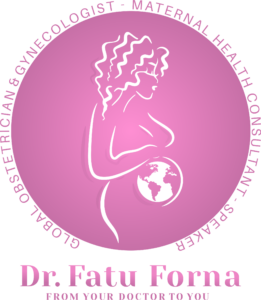Maternal Deaths are Preventable: 10 Things Every Black Woman Should Do to Have a Safe Pregnancy

It seems like every other day, we get news of another black woman who has died during or after pregnancy. The US has one of the highest maternal mortality rates among industrialized countries, and black women are 3-4 times more likely to die during and after pregnancy than white women. There is just no way to quantify the anguish felt when a mother is taken away from her children, husband, family, friends, and community at the prime of her life! As medical professionals, we need to work harder to keep pregnant women safe in the US, and we need to work especially harder to keep the most vulnerable women – black women, other women of color, poor women, and rural women safe.
As black women, we need to know, and we need to let our communities know that maternal deaths are preventable, and that there are things we can do to ensure we have a safe pregnancy. Below are 10 things every black woman should do to have a safe pregnancy.
- Optimize your own health before you get pregnant. Pregnancy is very taxing on your heart and your body, and women with high-risk conditions like obesity, hypertension or diabetes can have very high-risk pregnancies.
- If you are obese (BMI > 30) or overweight, try your best to lose weight before you get pregnant.
- If you have hypertension or diabetes, go see your primary care doctor and make sure you are on the right medications for pregnancy, and that your blood pressure, blood sugars, or other high-risk conditions are very well controlled before pregnancy.
- Try your best to have babies early if possible – you are considered high-risk and of “advanced maternal age” if you are over age 35, and the risks really get much higher over the age of 40. You can have a safe pregnancy at an older age, but you have to make sure you are in the best of health before pregnancy. Women for example who are over age 40, obese, and have hypertension, can have pregnancy complications that can put their life at risk.
- Get the right doctor and care team that you trust. Make sure you have a care team that can partner with you to ensure that you have the best pregnancy outcomes. Get an obstetrician/gynecologist (OB/GYN) and a midwife who listens to you, who genuinely cares for you and sees you as their sister, their mother, their child, or their friend. Discrimination and implicit and explicit biases are a real contributor to the higher risk of death that black women face in America, so make sure that you find a care team that can provide care to you without bias.
- Get a healthcare advocate. Someone who can partner with you throughout your pregnancy journey. Someone who checks up on you, accompanies you to appointments and to your delivery (in person or virtually), makes sure you are doing what you are supposed to be doing, someone who provides psychosocial support for you, and someone who advocates for you and raises hell if need be to get you or your care team to do right. This person can be a trained doula, a spouse, a mother, a sister, or a friend.
- When you find a good doctor that you trust, listen to them. Partner with them and believe that they have your best interest at heart. Don’t let Dr. Google or bad advice get in the way and convince you to do things or refuse care that could be harmful to you or your baby. When your doctor tells you that you need to be admitted to the hospital or stay home from work, get admitted or stay home from work.
- Don’t lose sight that the main goal of the pregnancy is to come out of the pregnancy with a healthy mom and a healthy baby. We all have plans and desires about how we want our pregnancy and our birth experience to be. Sometimes it is ok to deviate from a birth plan, or the romantic idea of a particular type of birth, or a wonderful baby shower that we had planned, if we need to do so for our health or the health of our baby. Get used to the fact that the baby is now in charge and depending on his/her mood, he/she can upset the best of plans!
- Wrap a cocoon around yourself when you are pregnant. Psychosocial support is critical to a healthy pregnancy, because pregnancy and having/raising a newborn baby can be a very stressful time. Make sure you have a spouse/partner, family, or friends that can support you during your pregnancy. Seek help if you are having financial difficulty, difficulty with housing, food, transportation or getting health care. Get a social worker to help. Monitor your job-related stress and try to change how you work if possible. Get a therapist to help you work through stress and anxiety that can happen commonly during or after pregnancy. There are times when complications like premature labor or rising blood pressure might make your doctor put you off work early – don’t fight that and try to be a superwoman, remember that your health and the health of your baby comes first.
- Be an active participant in your healthcare and help keep yourself safe from complications like hypertension and heart conditions. Make sure you are watching out for and trying to prevent some of the major causes of maternal deaths like hypertension and heart conditions. If you develop hypertension, you will need close monitoring to ensure your blood pressure stays in a normal range during pregnancy and until at least 6 weeks after delivery.
- Most black women fit the criteria to be on a baby aspirin starting in the first few months of pregnancy to help prevent a hypertensive complication called preeclampsia, so ask your doctor about whether you need to be on a baby aspirin every day.
- Buy a blood pressure machine and check your blood pressure once a week. Let your doctor know immediately if your blood pressure is high (140/90). Severely high blood pressure (160/110) is an emergency, contact your doctor as you usually need immediate treatment and might need to be hospitalized.
- Watch out for the warning signs of preeclampsia that can include changes in your vision, severe headaches, sudden abdominal pain, or swelling in your face and hands. Let your doctor know if any of these signs happen.
- If you have or develop hypertension, check your blood pressures twice a day and let your doctor know if your blood pressures are high. Make sure you have been referred to a high-risk obstetric doctor called a Maternal-Fetal Medicine specialist who can help manage your blood pressure medications while pregnant, and can make sure you have had tests on your heart like an EKG, to ensure that your heart can tolerate the stress of pregnancy well.
- Help keep yourself safe from complications like hemorrhage. Make sure you are watching out for and trying to prevent another major cause of maternal death – hemorrhage, which is heavy bleeding during or after childbirth. You can help decrease complications from hemorrhage if you prevent anemia while pregnant. Many pregnant women can become anemic, so eat iron-rich foods. Take a prenatal vitamin that has iron every day. If you are diagnosed with anemia, you might need to take extra iron and if your anemia is severe (Hemoglobin <10), ask your doctor if you are a candidate for an intravenous iron infusion. If you have a normal blood count and are not anemic at the time of delivery, you are less likely to have severe complications if you have a hemorrhage.
- Find a doctor that practices evidence-based medicine. Medicine is rapidly changing and there are protocols and guidelines that are recommended by the American College of Obstetrics & Gynecology, which when used to promote vaginal birth and decrease cesarean sections, and to manage complications like hypertension, hemorrhage and infection, will ensure that you are getting the best quality care during your pregnancy.
- Enjoy your pregnancy. Once you have found a good care team that you trust, a good support system, and once you are actively participating and taking charge of your own health, try to relax and enjoy the journey through pregnancy. Stay vigilant and collaborate with your team to make sure you have a safe and healthy pregnancy, because we must all join hands to ensure that no woman dies while giving life!
Dr. Fatu Forna is an obstetrician-gynecologist, epidemiologist, and writer, who works to improve reproductive and maternal health and reduce maternal mortality around the world.







